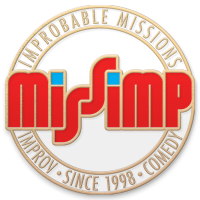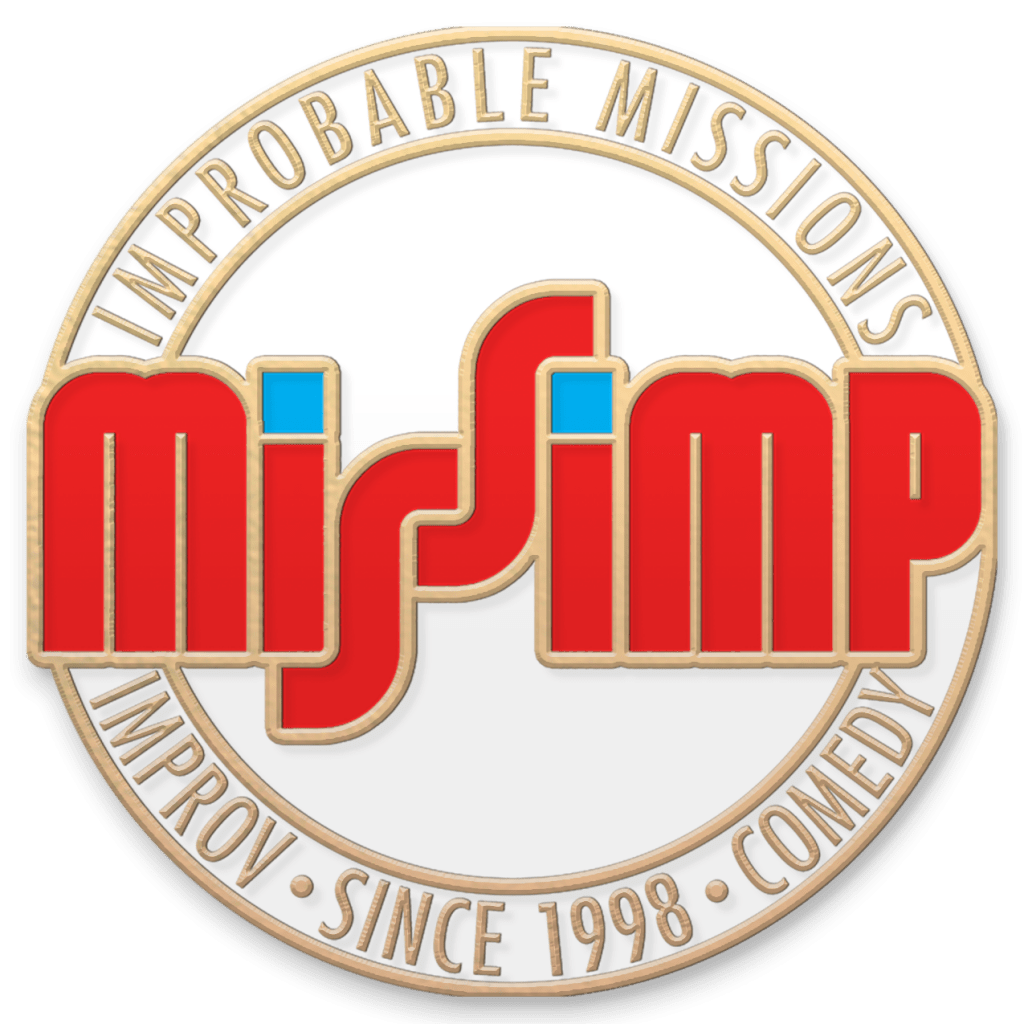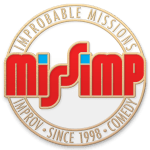In the words of MissImp performer Trilochon Chatterjee:
Workshops of the gods
A couple of weekends ago, I joined a bunch of MissImpers at a workshop by Brandon Gardner of New York’s Upright Citizens’ Brigade theatre. The most intriguing part of this for me was his introduction to the idea of ‘game’ in improv comedy.
It gave me a lot to think about – and being me I like that – but ultimately what I got out of the workshop was something I needed: a greater sense of purpose in scenes.
Whether at jams or on stage, you can often be left in the no man’s land of ‘where are we actually going with this?’ Some strong character choices have been made, and interesting details have emerged about them. But then, within a few lines, you and/or your partner have lost sight of your shared purpose. To avoid grinding to a halt, you end up focusing on the ‘what’ of the scene rather than the ‘who’ and ‘why’ – trying to flesh it out further without the supporting skeleton of clearly motivated characters, and ending up with a pile of decomposing meat on the floor. And then you think to yourself – ‘I could’ve eaten that meat. What a bloody waste.’
Say My Game
In the UCB improv style, ‘game’ is a pivotal concept, both in keeping players focused on their characters, and as a fast track to ‘finding the funny thing’ about a scene. Simply put, a ‘game’ is a particularly unusual or interesting character behaviour or motivation that is exploited by the players for comedic effect. As is natural in improv, you happen upon games through your initial scene work and character development. The skill comes in recognising games as they are emerging, and understanding when and how they work.
This may all sound a little too contrived a thought process to strictly be improvisation, and at first it was – deliberately so.
In pairs, Brandon got us to play a bunch of ‘straight’ scenes (without any comedic intent) with specifically dramatic premises: two brothers mourning their dead father, a university student coming out to his dad. After each scene, he would switch the premise to something much less consequential: the brothers mourning the closure of their favourite restaurant, the student changing uni courses – but asked us to maintain the emotional associations and significance of the original scene.
The absurdity of the second scenes made them innately hilarious. And surprisingly, despite the altered premises, there were still a wealth of ridiculous parallels that could be drawn between each set of circumstances – which wouldn’t have been so vividly apparent without the deliberateness of the set ups. The notion of such ‘mapping games’ was a great way to start thinking about the sorts of ‘unusual’ behaviours around which other games might naturally form.
Squeeze It
Next we learned that improv games are like desirable posteriors, in that once you’ve got one, you’ve gotta learn how to work it.
 We started some scenes based on familiar premises provided by Brandon, which he would interrupt early on to ask us what we felt was out of the ordinary about the behaviour of one of the characters. Once identified, it became the other player’s task to ‘set up’ that character to demonstrate their attitudinal oddity – each time in a more heightened way. What was being ‘heightened’ here wasn’t necessarily an emotion, but the amplitude of the initial oddity. The associative mantra ‘if this is true, what else is true?’ came up frequently. If a fisherman winces at the gutting of a dead fish, he might also cringe at the crushing of ice, or weep heartfelt tears at the cutting of paper. Of course, these are preposterously overblown reactions, but they also advance the game of the ‘oversensitive fisherman’ in a definite direction, each time with greater impact.
We started some scenes based on familiar premises provided by Brandon, which he would interrupt early on to ask us what we felt was out of the ordinary about the behaviour of one of the characters. Once identified, it became the other player’s task to ‘set up’ that character to demonstrate their attitudinal oddity – each time in a more heightened way. What was being ‘heightened’ here wasn’t necessarily an emotion, but the amplitude of the initial oddity. The associative mantra ‘if this is true, what else is true?’ came up frequently. If a fisherman winces at the gutting of a dead fish, he might also cringe at the crushing of ice, or weep heartfelt tears at the cutting of paper. Of course, these are preposterously overblown reactions, but they also advance the game of the ‘oversensitive fisherman’ in a definite direction, each time with greater impact.
Of course, the tide that flows must also ebb. A crucial if tricky lesson was the idea of ‘resting’ a game after its been played. This involved going back to the environment or situation, and letting the scene return to it’s own relative normality. Doing this gave both the players and the audience a chance to reinvest themselves in the scene, and more time to find new sources from which the initial game (or perhaps others) might emerge. It also gives the free associative brain some much needed breathing room.
Mining for Comedy Gold
On the day, the greatest challenge was consciously retaining so many different (if intimately related) goals – finding games, heightening them, resting and then returning to them. The ideas definitely require practice to embed, but also provide a rich seam of collaborative creativity for improvisers like us to mine.
There was much more to Brandon’s workshop than just the above. Overall, however, being coached by someone who understood and articulated the ideas so well was the kind of opportunity I hope to see a lot more of.





4 thoughts on “Tastes A Bit Gamey”
UCB has a very specific style of play… maybe developed by Matt Blesser (their head dude) or Amy Poehler, I’m not sure. They have a podcast on Itunes that I highly recommend as listening to two or three of them really gives you a clear picture of their style of play. It is all about the game and there is little to no story in their work except how it relates to the game (this is not criticism, just observation). This makes them some of the best “game” players out there. What luck to get to learn under Brandon. Identifying and following games is tricky business.
Hey. Thanks for the comment and the recommendation.
I’ve been very aware of Matt Besser’s work of late. I imagine the podcast you’re referring to is either asssscat! or improv4humans (also available via earwolf.com), the latter I’d been listening to for a month before the workshop with Brandon.
Improv4humans definitely provides a crash course in UCB-style game for anyone interested – at times you can almost visualise the thought process, the ‘game-think’. At it’s worst/laziest, it’s basically saying what you think until something funny happens, but played at is best it makes for insane funnies. The show reveals how potentially hit and miss the approach can be when a game fails or goes horribly awry.
There’s a lot to unpack from it though, and honestly I wouldn’t mind another workshop like we had just to explore the possibilities!
There’s also the very good but highly irregular UCB podcast. I haven’t listened to the LA one but I should add it to my BeyondPod one of these days.
http://www.ucbcomedy.com/podcasts/ucbtny
http://www.ucbcomedy.com/podcasts/ucbtla
Reblogged this on The Year of Improv and commented:
Great examples of games.
Comments are closed.